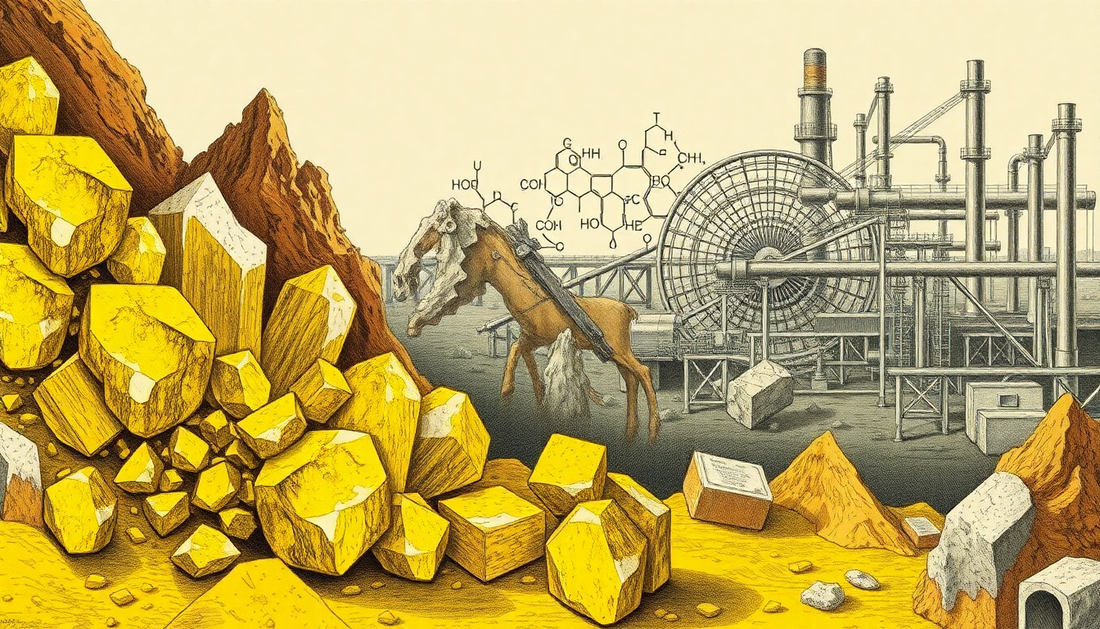Sulfur is a fascinating element that is widely distributed in nature and finds a variety of applications in industry and daily life. In this blog post, we will explore the fascinating world of sulfur - from its origins as a mineral to its diverse technical uses.
The formation of sulfur
Sulfur is a naturally occurring element found in various forms in the Earth's crust. Volcanic activity, geothermal springs, and bacterial processes are the main sources of sulfur formation in nature. In volcanic areas, sulfur can be found in the form of crystalline deposits or as yellow crusts on the surface.
Furthermore, sulfur is also produced as a byproduct during the extraction and processing of fossil fuels such as petroleum and natural gas. Here, sulfur is removed as an impurity from the raw materials and subsequently further processed.
The diversity of sulfur compounds
In addition to its elemental form, sulfur also occurs in numerous chemical compounds. Some of the most important sulfur compounds are:
Sulfur dioxide (SO₂)
Sulfur dioxide is a colorless gas with a pungent odor that is produced during the combustion of sulfur-containing materials. It is used in the paper, textile, and food industries as well as a disinfectant.
Sulfuric acid (H₂SO₄)
Sulfuric acid is one of the most important industrial chemicals. It is required in large quantities for the production of fertilizers, plastics, dyes, and many other products.
Hydrogen sulfide (H₂S)
Hydrogen sulfide is a toxic, flammable gas that occurs naturally in volcanoes, natural gas fields, and sewage sludge. It is used in the chemical industry and can also be utilized as a fuel.
Organic Sulfur Compounds
In addition to inorganic sulfur compounds, there is also a variety of organic sulfur compounds that occur in living organisms. These include amino acids such as cysteine and methionine, as well as vitamins like biotin.
Sulfur in Industry
Sulfur and its compounds have a wide range of applications in industry:
Fertilizer Production
Sulfur is an important component of fertilizers, as it is essential for plant growth. Sulfur fertilizers are used to compensate for sulfur deficiencies in the soil.
Rubber Manufacturing
Sulfur plays a central role in the vulcanization of rubber. By cross-linking the polymer chains, rubber becomes more durable and resilient.
Paper Manufacturing
Sulfur dioxide is used in paper manufacturing to break down and bleach wood fibers.
Pharmaceutical Industry
Sulfur is used in the production of pharmaceuticals, disinfectants, and cosmetic products.
Chemical Industry
Sulfuric acid is one of the most important basic chemicals and is needed for the production of artificial fertilizers, plastics, dyes, and many other products.
Sulfur in the Environment and Health
Although sulfur is an important component of many industrial processes, its impacts on the environment and health must be carefully monitored. In particular, sulfur dioxide and hydrogen sulfide can be harmful to health in high concentrations.
Therefore, strict emission limits and safety regulations are adhered to in order to minimize exposure to sulfur compounds. At the same time, research efforts are being made to make the use of sulfur more environmentally friendly and to develop new, more sustainable applications.
Conclusion
Sulfur is a fascinating element with a long history and diverse applications in industry. From its origins as a natural mineral to its technical uses in chemistry, pharmacy, and materials science, sulfur has played an important role in our modern world. Through careful regulation and innovative research, we can harness the benefits of sulfur while simultaneously minimizing its impacts on the environment and health.































































































































